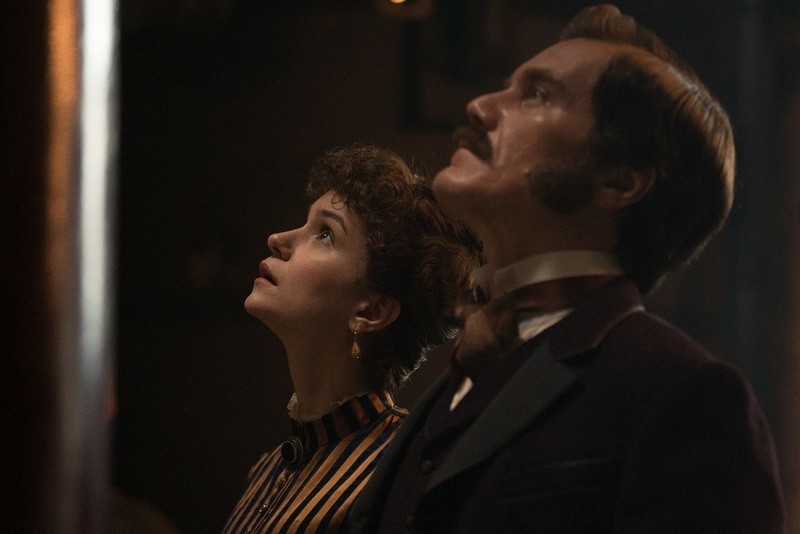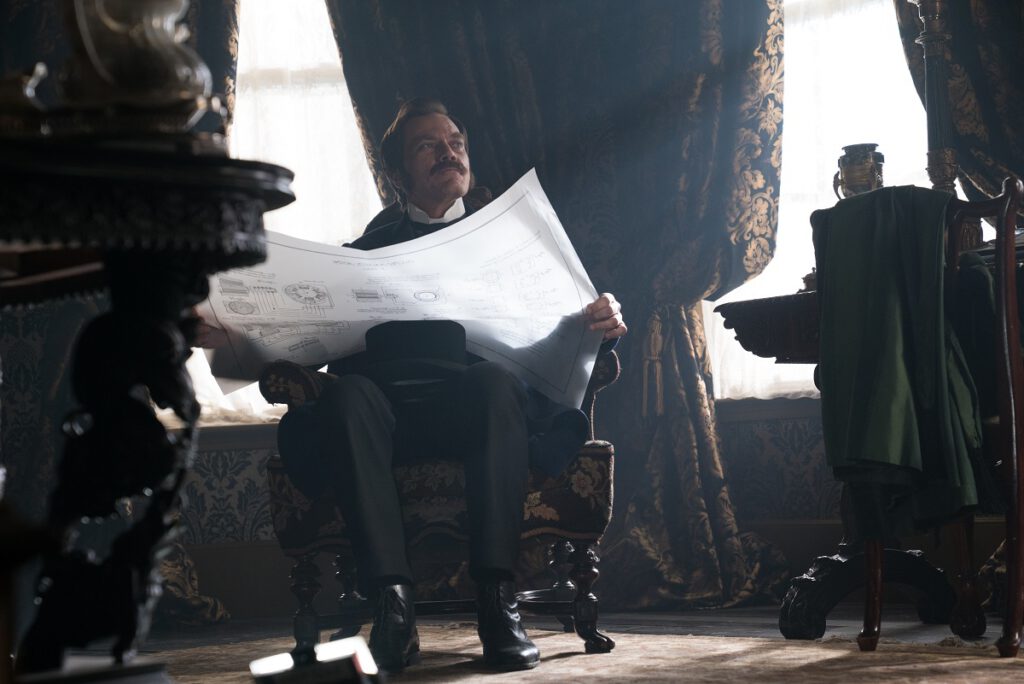“The Current War” was not well-received during its world premiere at the 2017 Toronto International Film Festival, and there were rumors of a clash between director Alfonso Gomez-Rejon and producer Harvey Weinstein over the final cut. When Weinstein had his public fall from grace only a couple of weeks later, the film was pulled from the release schedule, where it had once been primed for an award season run, and there was some question as to whether it would ever see the light of day. Two years later, the film is not only finally being released, Gomez-Rejon was even allowed to go back and rework it to fit the vision that he had for it. That version, known as “The Current War: Director’s Cut,” is now in theaters and Michael Shannon, whose performance as George Westinghouse is one of the best things about it. Shannon recently sat down with RogerEbert.com to talk briefly about the film, the challenges of playing a historical figure and the long journey that the whole enterprise took before finally making it to theaters.
Throughout your film career, you have played a number of real-life people, some of whom are well-known to most people and some who were completely unfamiliar to audiences. By playing George Westinghouse in “The Current War,” you sort of cover both extremes in that the Westinghouse name is undeniably familiar to a lot of people, but few of them presumably have any grasp of anything about him other than his name. As an actor, is it more freeing to play a historical part like that where you don’t have to recreate a known public persona as, say, you did when you played Elvis Presley?
It is interesting. I don’t suppose that there is anyone out there who could tell me that I did it the wrong way. We had the premiere in New York and there was a woman who came up to me who works for the Westinghouse corporation and she said that she was very moved by my portrayal and felt that, in her mind’s eye, it was pretty accurate. I thought that was fascinating because this woman has never met Westinghouse, but she studied and is part of the culture at Westinghouse and it meant something to her that I captured that essence. How I did that, I am not entirely sure. I had a book that Alfonso had given me—it just said “George Westinghouse” on the cover, and it was kind of a tribute to him and his life. It was a bit of a fluff piece that talked about what a swell guy he was. I’m sure that he wasn’t a saint, but he seemed to be pretty special, at least in terms of being a rich industrialist but also having a heart and caring about people.
It is interesting that through Westinghouse and his approach to business, the film is suggesting that one can be massively rich and still have some kind of reasonably ethical approach to business dealings.
It was an example that I was eager to put out there. I am pretty scornful of people who think that just making a mountain of money, at the expense of everything else, is the most important thing. It was nice to have the opportunity to show that here was a guy who didn’t do that.
Edison, at least as depicted here, seems driven almost entirely by the need for success at any cost while Tesla is basically interested only in the technology and nothing more. Both of those approaches have plenty of modern-day analogues but there really doesn’t seem to be one nowadays along the lines of Westinghouse’s approach.
Look at Bill Gates. It is different because it isn’t philanthropy—all of those guys, like Mellon and Morgan, gave away plenty of money. It is more about how you go about making that money in the first place. It would be nice to have someone like Westinghouse around.
What were the other aspects of “The Current War” that intrigued you and led to you doing it?
First of all, there was the fact that I knew so little about it. It is kind of embarrassing that as reliant I am on electricity, I have absolutely no idea of how it came to be that I can walk into a room and turn on a light switch and the light comes on. It seems like a story that we should all know, and yet I feel as if hardly any of us do. One of the main draws with me in all of the work that I do is that I just learn things that I didn’t know otherwise because I didn’t learn a lot in school. This kind of learning sticks with you more because it is actually three-dimensional and not just writing an essay or something like that. You get to try to imagine what it was actually like to be in that situation.
I knew a little bit about the story, mostly because my dad was interested in the World’s Fairs that happened in Chicago and so I was familiar about the competition between Edison and Westinghouse to get the contract to light up the fair in 1893.
I would have totally taken that for granted. I never would have even thought that people were bidding to power the World’s Fair. The World’s Fair is one of the most significant events of the last 200 years culturally, so it was a big deal.

The structure of the film is unexpected, in the sense that even though the film is about the great rivalry between Edison and Westinghouse, there are maybe only two scenes in which the two are actually seen together. How does a narrative along those lines affect your approach as an actor, especially regarding those scenes where you and Benedict Cumberbatch do get a chance to face off against each other?
It was really interesting, actually. I didn’t feel like it led to any deficiency for me. I did look forward to getting to that scene at the end when we actually do meet and talk. It was actually one of the last things we shot, which was very fortuitous because we were able to have lived with the characters for a while and we were able to bring that experience to the scene. It is funny. I imagine the experience I was having was pretty similar to the one that Westinghouse was having. He desperately wanted Edison to come over to have dinner and spend some time with him and he just couldn’t get the guy to come around. The fact that I wasn’t seeing Benedict very much was pretty helpful, I think.
I did not see the version of “The Current War” that premiered at the Toronto Film Festival and which has reportedly been considerably reworked into the version that is now playing in theaters. Can you talk about how the film has changed and your thoughts on the entire experience?
It was a while ago, so it is not fresh in my mind what happened in Toronto. All I know is that it was a very hard experience for Alfonso, having to screen a film that wasn’t his vision. I can’t imagine something more painful. When you direct a movie like this, you are not doing it for money or glory or anything. A lot of these directors, by the time they finish their commitment, they are lucky if they break even. It is really just for the love and the passion for the story and their vision and he kind of got robbed of that. That version of the film was much more, for lack of a better word, traditional. I think Alfonso had a lot of ideas and things that he wanted to do with the music and the editing that he and Harvey didn’t see eye-to-eye on. It is very refreshing and rewarding to see Alfonso get another chance to actually institute his vision for it.
It definitely felt as if it had a faster pace to it than what I would normally expect from a historical drama along these lines.
That is interesting. A lot of times, the director’s cuts are longer and slower but this one is actually ten minutes shorter than the version we showed at Toronto. He went back and shot some additional footage and he still turned in a film that was ten minutes shorter. It is a very different vision than the one we saw in Toronto.












